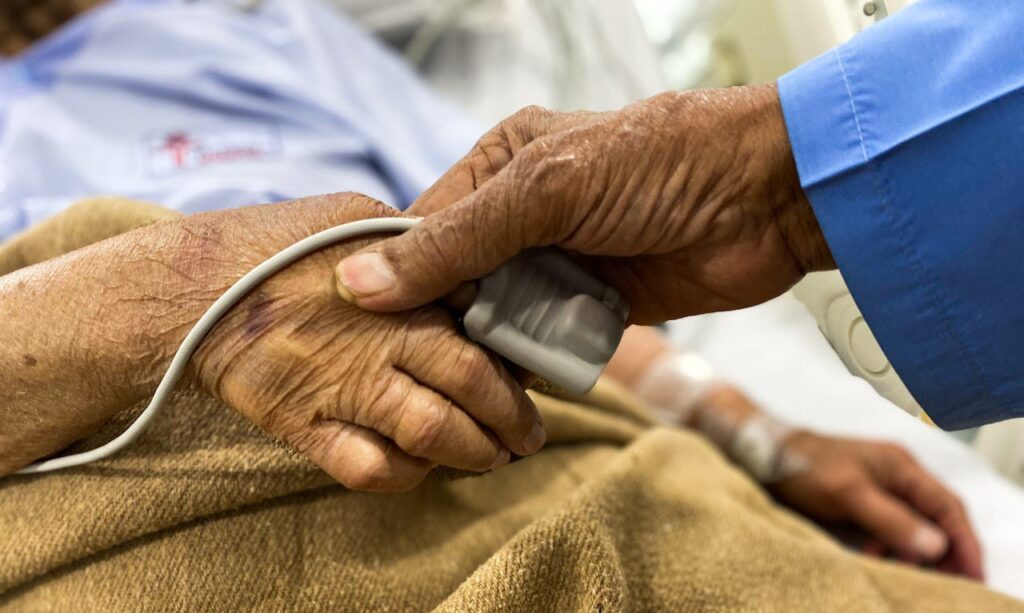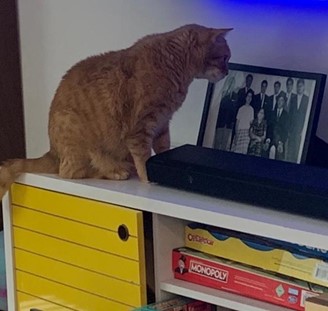
Dementia is a debilitating condition that affects millions of people worldwide. It robs individuals of their cognitive abilities, memories, and ultimately, their independence. As dementia progresses, questions about the awareness of their impending death often arise.
Do loved ones with dementia know that death is near? What’s the best way to help them transition? How can you support yourself in the process?
I struggled with these questions with my father and was there as he took his last breath earlier this year.
In this article, we’ll review what to expect, how to ease their transition, and how the intersection of dementia and spirituality can give you a more profound perspective on their death and help you cope.
Preparing for End of Life
The emotional disconnect and fluctuating awareness of dementia patients make it challenging to determine their level of awareness of their mortality. Even if they are aware of their condition and current health, they may not hold onto this information.
Such issues create additional challenges for end-of-life care and decision making. To smooth the experience as much as possible, caregivers and healthcare professionals must approach the issue with sensitivity and empathy.
Advance Care Planning
We were incredibly lucky that my father (and mother) had their expressed wishes for their end-of-life written in their Advance Care Directive well before his Alzheimer’s advanced.
This became crucial after my father experienced a head injury and was rushed to the hospital, where he was given a poor prognosis. Any heroic efforts at brain surgery were likely only to worsen his quality of life, going against his Advance Care Directive.
Instead, the family decided to focus on morphine and make him comfortable instead.
My parents had cared for an aunt with Alzheimer’s disease as well and had witnessed everything that could go wrong. That personal experience certainly led them to write out their wishes on paper.
Why Advance Planning Matters
While it may not always be possible to have in-depth discussions about death with dementia patients, families, and caregivers need to engage in advance care planning. This involves making decisions about medical care, and end-of-life preferences, and ensuring that the patient’s wishes are respected as much as possible.
When to Begin Your Planning
It’s essential to initiate end-of-life planning as early as possible after a dementia diagnosis. This early start allows individuals to make important decisions while they still can express their preferences.
Advance care planning should include preferences about medical treatments, living arrangements, and legal matters like a durable power of attorney or healthcare proxy. This planning should involve not only the individual with dementia but also their family members or caregivers.
Open and honest conversations can help ensure that everyone understands the individual’s wishes and can advocate for their best interests as the disease progresses.
As the disease progresses, it’s crucial to regularly reevaluate and update the end-of-life plan. Decisions may need to shift from the individual with dementia to their designated healthcare proxy or legal guardian.
Regular reassessment ensures that the plan remains in alignment with the individual’s current needs and preferences, helping to provide the best possible care and support.
Focus on Quality of Life in Those Last Moments

During his last hours at the hospital, when we weren’t talking to my dad, touching his hands, or talking to him, we were in the room talking to each other. Don’t underestimate the fact that your presence alone may be a source of comfort, as they can hear familiar voices.
It is crucial to prioritize your loved one’s comfort, dignity, and quality of life in a supportive environment that minimizes distress and maximizes their well-being.
How Hospice Can Help
If you’re loved one isn’t in hospice care at this stage, it’s never too late. Hospice can be delivered at home or in any facility. Hospitals will also make hospice services available when a patient is near death.
Hospice can offer significant comfort care and vital support for both the patient and family members. The services don’t mean that you’re giving up. Instead, hospice involves a shift to focusing on quality of life over duration.
I noticed that hospice staff and nurses were very attuned to my father’s movements to detect discomfort and were tracking his breathing. We knew that his labored, gurgly breathing was a sign that he was close to transitioning.
Additionally, when I first arrived at the hospital, besides being on a morphine drip, I noticed the staff had soft music playing and had warm blankets on him. At this point, his hands were cold regardless of the pile of blankets – another sign of impending death.
Tap Into Your Spirituality and Theirs
Although my Dad had a traditional Catholic upbringing, and his kids were subjected to Cathecism, he grew into a skeptic of the church later in life. He and my mom often questioned how there could be such widespread poverty, while the Vatican was plastered in gold.
In his late adulthood, he had tossed aside religion in favor of spirituality. My father believed something divine was watching over us, and that our existence transcends our physical bodies.
To the extent possible, get a clear understanding of where they stand on religious and spiritual beliefs. Keep in mind, that these evolve and mature as we age.
Examining your own beliefs and faith can help you through this difficult period, but also provide reassurance that your loved one is moving into an incredible, new phase.
Dementia and Spirituality – A Time for Transition
In the months, weeks, days, and hours leading up to their death, you’re likely going to be flooded with a wide range of emotions and may experience anticipatory grief. You may be questioning your own beliefs about the dying process and the afterlife.
Existential questions are bound to surface for you. I too couldn’t help but gravitate toward reading everything metaphysical leading up to and after his death earlier this year.
Quantum Physics
While our scientific methods and limited human perception are far from grasping the nature of our existence and what happens when we die, some branches of science are on the brink. Recent scientific discoveries have shown that quantum physics is closely intertwined with spirituality, and suggest that our consciousness is tied to a universal, cosmic energy; and not bound to our physical bodies.
Quantum physics has sparked discussions about life after death and reveals the deep connection between consciousness and the universe. Some believe in an afterlife by drawing inspiration from quantum concepts like entanglement, where particles instantly affect each other regardless of distance.
This perspective can help us see individuals with dementia as more than their declining cognitive abilities, fostering empathy and a sense of interconnectedness among caregivers and family members. It allows families to embrace their loved one’s existence beyond this lifetime.
Visions Before Death
In Psychology Today (2016), many hospice nurses have borne witness to dying patients in hospice having visions or hallucinations. An estimated 57% of those visions were with deceased relatives, with nurses reporting that patients had full-on conversations with those relatives.
A review of five unique qualitative studies found that approximately 50% to 60% of patients in hospice care reported experiencing some form of deathbed vision or spiritual experience. These visions often involve encounters with deceased loved ones, a sense of peace, or a transition to a serene and comforting environment.
Visions or hallucinations reported by individuals with dementia near the end of life can take various forms. Some common themes include seeing deceased loved ones, beautiful landscapes, or religious figures. Others may describe a sense of peacefulness or a feeling of “crossing over.”
These visions are often described as comforting and may bring a sense of calm to individuals as they approach death. Researchers and healthcare professionals believe that they may be a natural part of the dying process and a way for the mind to cope with the transition.
There’s no reason to believe that persons with dementia wouldn’t have these same visions, though it may be less likely that a non-verbal patient would be able to engage in these two-way conversations. Still, the presence of passed loved ones can only bring calm and comfort to the patient.
Terminal Lucidity
Towards the end of life, some people with advanced dementia can experience a brief period of clarity, coherence, and improved cognitive function, which is known as terminal lucidity.
This remarkable and often unexpected episode can help individuals with dementia to recognize loved ones, engage in meaningful conversation, and exhibit a level of awareness that had previously been lost due to the progression of their condition.
Although its underlying causes remain largely unknown, terminal lucidity has intrigued researchers and caregivers alike, with some speculating that it could be linked to various factors such as physiological changes in the brain, the release of endorphins, or a natural response to the end of life.
Despite the uncertainty, terminal lucidity can provide a precious opportunity for family members to connect with their loved ones one last time and share moments of emotional closeness in the face of a challenging journey with dementia.
What We’ve Learned from Near-Death Experiences
Regardless of your religious beliefs, it’s hard to argue with a growing body of science on the thousands of individuals worldwide who have had Near-Death Experiences (NDE). Thanks to modern science, more people are literally being brought back from the dead every day.
You can hear many accounts of NDEs on the Next Level Soul podcast by Alex Ferrari from persons from all walks of life. Still, these only capture a fraction of the thousands of accounts worldwide.
What These Experiences Can Involve
NDEs have intrigued researchers and the general public alike. There are common aspects shared by many individuals who have undergone these experiences. Many NDErs report an “out-of-body” sensation, where they observe their bodies or the surrounding environment from a different perspective.
The encounter with a warm, bright, loving light or a tunnel is a recurring theme, evoking profound feelings of peace and acceptance. Common aspects of NDEs include a heightened sense of awareness and clarity, often described as more vivid and real than ordinary waking experiences.
Additionally, a life review often occurs, where individuals relive significant moments and their impact on others. Encounters with deceased relatives or spiritual entities are frequently described, offering reassurance and guidance.
These common elements in NDEs provide compelling insights into the nature of human consciousness and the potential for an afterlife and have implications for the existence of an afterlife.
Provide Comfort and Reassurance

Helping a person with dementia transition toward the end of life is a delicate and deeply emotional process that requires patience, empathy, and a commitment to providing comfort.
During this transition, offer comfort and reassurance. Speak calmly and soothingly, using a gentle tone. Reassure them that they are safe and cared for and that you are there to support them. Avoid using complex or confusing language and instead use simple, clear sentences.
Physical touch, such as holding their hand or giving a hug, can also convey a sense of comfort and security. Remember that your presence and kindness can provide solace even if the person doesn’t fully understand what’s happening. With my father, my family had been in and out of the room, caressed his face, said reassuring words, held his hand, or touched his forehead.
Need Support?
As a Death Doula, Angelica guides and supports families through the end-of-life experience, giving you an anchor and safe space every step of the way.
Signs of a Transition
You may see and hear certain signs that their transition is near. For example, their breathing becomes labored, or gurgly, what some refer to as the ‘death rattle’ caused by their inability to clear fluids. As the signs of the end are evident, you might say “You can let go now.” In my own experience, I tapped my Dad on the chest and said “I hope you’re ready for the other side. It’s okay.” Within a few minutes, he took his last breath.
Lean Into Validation
Validate the person’s emotions and concerns, even if they cannot articulate them clearly. They may experience fear, confusion, or sadness as they approach the end of life. Be present to listen, acknowledge their feelings, and offer empathy.
You can say things like, “I know this can be frightening, but I’m here with you,” or “It’s okay to feel this way; I’m here to support you.”
By validating their emotions, you create a sense of trust and connection, which can help ease their transition and reduce distress. When they feel your calm, they can leave this world in peace. You could encourage them to ‘Go with God.’ or “Go toward the light, and be with the divine.” depending on what you feel may resonate. At this stage, most individuals are already straddling the earthly and angelic realms.
Ultimately, the words you say should be guided by your understanding of the person’s unique needs and preferences. It’s important to remember that communication abilities may vary greatly among individuals with dementia, so adapt your approach accordingly.
Grieve In Your Own Way
After they pass, honor them and grieve in your own way. Here are some examples, including some that worked for me.
Talk to Them
After his death, I talked with my dad daily. That’s correct. This was the most therapeutic and cathartic for me.
Your loved ones are listening and walk beside you.
I talked to my father while I was driving while cooking, cooking, or sitting at my desk.
My dad had a lot of catching up to do on the other side, especially as he had spent almost 18 years with dementia. I was more than happy to brief him on everything he had missed.
Enjoy Visitation Dreams from Your Loved One
I’m lucky to be in the rare 1% of the population that regularly has non-drug induced lucid dreams naturally. I found immense closure during several visitation dreams from my dad after he passed.
They were often profound and filled with messages from him, including one where he revealed a family secret that was later confirmed to be true by my mother. It was intel that was impossible for me to have learned from anyone else.
In another dream, I asked him “Hey Dad, what are you doing here?!” and hugged him. I could feel the hug, as if I were hugging him in real life.
The early dreams seemed to focus on him letting me know that he made it to the other side and was back to his healthy clear-minded self, and was no longer that guy with dementia.
These days, he brings other messages, including warnings about things such as not taking my dog to the lake one day to avoid the pup getting very sick. If you have those visitation dreams, don’t let anyone tell you they weren’t real.
Surround Yourself with Family and Friends…sometimes
We had scores of family and friends visit my mom and other immediate family, bringing us food and sharing their warm condolences.
This may be helpful for some, but I found that more often than not, I wished to be left alone. I didn’t want to be on work Zoom calls either, where people’s well-wishes triggered meltdowns.
My grandmother died two months after my father, and my aunts organized prayer for nine days with family friends praying the rosary, a Mexican and Catholic tradition. I did not partake, and my aunts shared that it was helpful to them on some days, but was overwhelming for them at other times.
In short, find a balance that works for you.
Take Advantage of Hospice
The hospice from the hospital reached out to me shortly after my dad passed to check up on me.
Stay in touch with them.
They offered excellent tips for helping my young daughter cope with his loss as well. They continue to be a resource, so stay in touch with them and reach out to them, even if it’s just to talk. They can also assist with practical matters related to death, making them even more invaluable.
Meditate
Meditation offers numerous mental and emotional benefits, such as reducing stress, anxiety, and depression, promoting relaxation, improving emotional regulation, enhancing mindfulness, increasing focus and productivity, and boosting overall cognitive function.
On a spiritual level, meditation can provide a gateway to higher consciousness and spiritual insight. By quieting the chatter of the mind, meditation can create a receptive space for accessing the higher mind and connecting with spiritual guides or inner wisdom.
Many practitioners report experiencing profound spiritual revelations, a heightened sense of intuition, and a deeper connection to their inner selves or higher purpose through meditation. Whether one’s belief system includes spirit guides, angels, or a broader spiritual realm, meditation can be a valuable tool for those seeking spiritual growth and a deeper understanding of the mysteries of existence.
Pick Up on the Signs from Beyond
This may border on the paranormal, but let’s admit that weird things often happen after someone dies. The signs will be very unique to you and your relationship with your loved one.
The very next day after he passed, while crying in my car, I saw a license plate with the very unique nickname my Dad used to call me, followed by my lucky number. My sister also shared that while driving and asking herself why she wasn’t getting any signs from my Dad, a grand rainbow appeared before her – and it had not rained.
One of my cats, who had last seen my Dad 7 years ago, began staring at an old black and white photo where my Dad was pictured in the center. Something he never did before he passed. In the picture below, you can see my cat staring at his photo – and no, it’s not due to any reflection. This would occur throughout the day and any type of lighting. It didn’t spook me one bit.

One night, my mom felt that my Dad had grabbed her foot in the middle of the night, something he often did while alive for kicks. When my grandmother passed, my aunt shared that a bell she’d use to get her attention went off on its own at least four times during that following night. It startled her, but we believe it was grandma just saying hello from beyond.
Head to Your House of Worship of Choice
If you’re part of a religious organization, connect with the religious clergy. They can often provide guidance and offer perspectives that may align with your beliefs.
Visit their Gravesite
Honor their life in how you see fit. My Dad’s ashes were placed in a mausoleum, near my grandfather. My grandmother’s ashes were laid to rest there a few months later.
He would’ve been 85 years old on his birthday which occurred just a few months after his death, so we visited the site on his birthday. However, I tend to believe that his spirit can be anywhere and everywhere, not stuck at some gravesite.
Conclusion
End-of-life is a challenging and emotional time in any situation. Dementia makes things more complex, as it’s hard to know how much your loved one understands about what is happening.
This is why the connection between dementia and spirituality is so important. Connecting with your own spiritual background and that of your loved one can make the transition calmer, gentler, and full of love.
Advance care planning and hospice support is important too, helping families to make important decisions about their loved one’s care and ensure that their wishes are honored.
Above all, your presence, kindness, and attentiveness play a central role in helping them navigate this challenging phase of life with dignity and comfort.
Need Support?
As a Death Doula, Angelica guides and supports families through the end-of-life experience, giving you an anchor and safe space every step of the way.

Leave a Reply